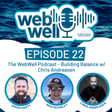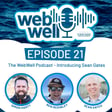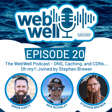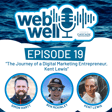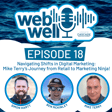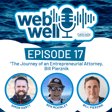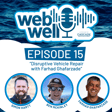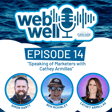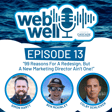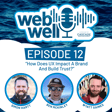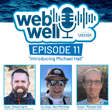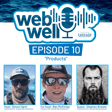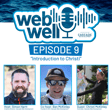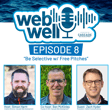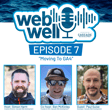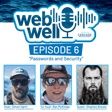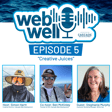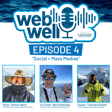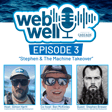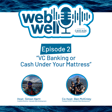Introduction and Guest Welcome
00:00:06
Speaker
Welcome to the web well podcast brought to you by cascade web development All right, welcome back listeners this is Simon at the web well podcast joined with Ben McKinley and Special guest the world renowned and I say it that way because I've heard a lot about you Ryan Ryan Buchanan welcome Thanks for having me looking forward to this
Friendship Stories and Memories
00:00:31
Speaker
Excellent. Well, Ryan, it's pretty fun to be on the other side of the mic here. I know you'd, during your podcast days with Cause and Effect, I really enjoyed sitting on that podcast. And this will be a really fun one. Ryan and I have developed quite the relationship over the last, I think about 13 years. Ryan was kind enough to come share his story of trying to spin a product company out of a service company.
00:00:55
Speaker
uh, to both myself and, and my co-founder of Brown Live Fritz. And, uh, and then shortly thereafter, he joined us on our 10th anniversary company float down the lower rogue river and provided just tremendous entertainment for, for most everybody involved. Uh, some are still recording Jester for sure. Uh, and I think Paul, one of your employees is still upset with me for.
00:01:19
Speaker
waking him up with a wig on his head at like 6 30 in the morning that he was just really salty with me over.
Ryan's Journey to Oregon
00:01:29
Speaker
But Paul, please forgive me, please.
00:01:33
Speaker
You might be on to something there. Yeah. And then following that trip, we found ourselves in the mountains doing lots of fun back country ski trips and, and lots of other ways to just stay connected, connected as, as friends and with our families and, and, and also through business as well. So really excited to continue to peel and back some of the layers on Ryan as a person.
00:01:52
Speaker
as well as his successes through business and civic engagement. So to jump right into it, Ryan, I would say you are clearly a man of Oregon, but not a man from Oregon. Can you share a little bit about your journey from Maryland to Oregon and feel free to start, you know, start kind of back in the formative years.
Early Career and Passion for the Northwest
00:02:14
Speaker
Sure. Yeah. Yeah. I grew up in the suburbs of DC in Maryland and
00:02:22
Speaker
I formed a huge love of the outdoors, ironically doing backpacking in Tanzania on a
00:02:34
Speaker
an epic family trip we did for five weeks in Africa when I was 15 brought me indirectly to Oregon during summers in college. So I went to University of Virginia and just knew that I wanted to kind of experience the grandeur of the Northwest. So I
00:02:59
Speaker
landed my first real job as a night janitor at Glacier National Park and so that allowed me to do like eight different multi-night backpacking trips all over the park.
First Business Ventures in Portland
00:03:15
Speaker
I talked to myself quite a bit on the drive in my wood panel station wagon out to Montana and then I just like
00:03:25
Speaker
I knew the Northwest was the place for me. So then came back the next summer with a buddy of mine who you know, Eric Gaberson, and his mom's from Southern Oregon from Medford. Ben, I know you are too.
00:03:41
Speaker
And she, so they had been vacationing at Blackfeet Ranch for as long as Eric could remember. And so we got a job there, checking people into the ranch. And then I got them fired from that job. It's the only job I've been fired from because I went to Sister's Rodeo, biggest little show on earth, and didn't, I guess, get it like fully approved through my boss.
00:04:08
Speaker
So then I get a 50 cent raise as the dishwasher at the lodge there. So that was pretty epic. And I was hooked on Oregon. That was summer of 94. And so we're looking at almost 30 years later. And so Eric and another buddy, Rich Young and I,
00:04:32
Speaker
packed up the U-Haul that Intel paid for and a reload package that I got a job at Intel right after college as a finance guy. And yeah, the three of us moved out and took over Portland. We were used to going to bars in Charlottesville, Virginia and knowing a lot of people in college and then we would go out and not know a soul.
Friendly Competition and Mutual Respect
00:04:59
Speaker
And so we were like,
00:05:01
Speaker
This is different. And unfortunately, we met some great people and I can keep telling the story, but yeah. And then Ben, yeah, you and I, I saw somewhere on the notes there that we were frenemies. I was like, when have we ever been the enemy part of frenemies? I wouldn't say enemy. I know that we were a small mat relative to the, the growth of eRoy.
00:05:26
Speaker
and those days where you attracted a lot of attention from the local media and whatnot. And so I would just say more in the spirit of coopetition that I looked up to you and was like, man, the guy's got some stuff figured out and some really exciting momentum behind him. And I know we competed on a project or two together
00:05:51
Speaker
And those are probably, you know, again, meaningful to me in terms of like, we're going to win and we're going to, you know, succeed. And I quickly realized that, uh, life with Ryan versus using, you know, Ryan viewing Ryan as anything in the form of competition was a way better way to go about it. So just a reminder that you and I are both, I'm very competitive, but I always, yeah, always saw you as a partner on the.
00:06:15
Speaker
the professional front and the personal front like yours such a better skier than me i don't even try to compete so but yes okay now i see where you come from it's funny you mentioned like getting attention i think of myself as a.
Passion for Sports
00:06:31
Speaker
pretty laid back guy, but my youngest daughter who's now 18, she has in her phone whenever I call her, it's dad, the attention seeker, which is just such a gut punch, but I guess there's some truth in what your kids tell you.
00:06:50
Speaker
Oh, yes. Yeah. Well, you that's a great segue. So as you mentioned, the ski thing, I've spent probably more time than as productive pursuing my love of skiing. And and you're quite the capable ski yourself. But ball sports, that's an area where I certainly cannot hang. Talk to us to about, you know, obviously, you love the outdoors and getting out there and pushing yourself and, and finding your potential. But also, I know that a lot of that was cultivated in ball sports.
00:07:18
Speaker
in the early days and now manifesting in pickleball. Share a little bit about that. Well, one, I don't think anyone really thinks of ball sports as ball sports. It's like for a male, that's just a weird term. Anyway, we'll go with that.
00:07:37
Speaker
Yeah, I still play hoops every Tuesday night and love that because, you know, at the office, it's not like you can really like take someone out, boxing them out at the printer or anything. So it's nice to have a little contact.
Professional Achievements and Community Involvement
00:07:56
Speaker
And yeah, pickleball, it's sad when you get into your late 40s and that becomes like your
00:08:03
Speaker
you know, competitive outlet to get super hardcore about pickleball, but that's what, um, that's what I do from time to time. And, um, yeah, I mean, I do tennis, ping pong, um, soccer, whatever is available. I, I'm kind of a, I'm pretty good at a bunch of sports, but not like, yeah, I don't have a specialty like you do Ben. So, but I like it all.
Entrepreneurial Journey
00:08:31
Speaker
Excellent. Well, you're pretty good at whipping me and ping pong and pickle ball. It makes you feel any better. So always fun to get out there with you and whack the ball around a little bit. Gotcha. Let's just keep talking about balls. We got all day.
00:08:49
Speaker
All right, we'll change the subject. How about this? We'll go to like the professional side then. So Ryan, talk to us about running successful agencies. So thesis, a lot of your civic efforts, including the script. Maybe you can talk a little more about that journey and becoming an entrepreneur. And even more recently about a social, sorry, social entrepreneur. Maybe you can speak to that a little bit too.
00:09:17
Speaker
Oh, that's a huge gamut of experiences. Yeah, so I'll just go back to, at Intel for four years, Finance Guy, the whole .com revolution was happening in 99, 2000. I had a bunch of friends leave to go to Bay Area or start their own
00:09:44
Speaker
And so I jumped on the bandwagon and started a company that was called GC Materials, short for General Contractor Materials. So my great-grandfather, grandfather, and dad were all in the construction kind of real estate world. And so I thought, oh, I'll try and bring this paper approval process online.
00:10:10
Speaker
And it's called submittals. So long story short, gave it a go. And it didn't work out great. In the process, I met a bunch of other entrepreneurs. We started this entrepreneur group called Starve-ups, not Starbucks, but Starve-ups. We were all starving startups. And so I met a bunch of entrepreneurs through that in 2000.
00:10:40
Speaker
that led to me becoming friends with a couple guys, Leap and Mars, who started this company called Cooler Email, which is an email marketing software company way back in the day before there was good design and all those things. And so it was basically like a much
00:11:03
Speaker
like a poorly designed version of MailChimp, but it had great functionality and it was kind of like there was a magic to marketers being able to see real time how their email campaign was performing. So started a out of the ashes of this kind of failed GC materials company. I started reselling cooler email and then we another
00:11:33
Speaker
entrepreneur friend in Portland here, a guy named Kent Lewis, he and I started email ROI. And he was with me for the first year and we were able to, through lots of networking at different professional association events and all that, we were able to land a whole bunch of small to mid-sized companies as our clients to get them up and going with a branded email template and then get them
00:11:58
Speaker
kind of hooked on the software and then that led to microsites and then the advent of Facebook kind of led to kind of more social media type of stuff. So it was a progression that I've always had a kind of a growth mentality sometimes to my own detriment because
00:12:25
Speaker
We grew really fast. We were in 500 fastest growing company and bottom line, we were profitable, but not really wildly profitable and then tried to turn email ROI. We changed the name a
Shift to Social Entrepreneurship
00:12:41
Speaker
year later to EROI because we were doing more than email. We were doing web and all that. And then we tried to turn
00:12:47
Speaker
EROI into a software company in 2008, and over a three year period proceeded to invest slash lose over a million and a half. Then recession hit the software never really, you know, way too much competition, not enough differentiation, had to pull the plug on it.
00:13:12
Speaker
lost all that money, bank had a gun in my head, tasted iron in the back of my throat, almost had a heart attack, anxiety attacks, and almost went bankrupt and lost most of my employees through that process because our culture went to shit. And then we kind of got back to a steady state of like,
00:13:35
Speaker
getting back to owning that we were a digital agency and being more transparent that we were licensing the software instead of it being our software. And yeah, and then just for five years steadily dug out of that whole renegotiated the paying off my line of credit to the bank so that I had 15 months instead of a few weeks.
00:14:04
Speaker
And over that five year period, paid off my debts. And then we landed Nike as a, well, we landed Aramark first in 2012 as like an ongoing, lots of email and digital campaigns type of
00:14:26
Speaker
ongoing strategic relationship that and we still work with them. What is this 12 years later? And so we shifted the business model from kind of a one and done project base, which is really, really hard to sustain a business on in the professional services world to
00:14:45
Speaker
landing larger in this case consumer brands where we had hundreds if not thousands of campaigns that we were doing on an extension of that brand fully immersed and sometimes on campus with email addresses from our clients and all that stuff to
00:15:08
Speaker
drive all these campaigns, drive digital revenue, but do it in an elevated brand kind of way instead of like kind of discounting or anything like that, that would, you know, buy now, you know, that's not what we did. We did more of the elevated experience and it's, so we went from 41 employees down to like 10 and then
00:15:32
Speaker
over a 10 year, the past 10 years we're now at 312 employees. And it's been a wild journey of just like, I feel like the entrepreneurial journey is like looking at an EKG chart where it's just like within a day, it's just spikes high and low. And then it does that even more if you look at a week and a month and all that. So like, it's been a really good run
00:16:01
Speaker
Not to say that we haven't had really challenging times in the past 10 years, but it's been a good one, for sure. Yeah, indeed, indeed.
00:16:10
Speaker
So as you've gone down that path, I think some of your social entrepreneurship, using that term broadly, but that's been a really inspiring aspect of your work as well. Was that always kind of an undercurrent of your efforts or when did you feel like you had the capacity and the energy to really lean in and bring to life some of those efforts that now are helping so many people?
The Script's Mission
00:16:40
Speaker
Yeah, thanks. I would say that I'm been super aware of this kind of virtuous cycle of being plugged into the community that's helped my business and then give back to the, you know, whether it's nonprofits or professional association boards or anything like that, like been on the Friends of the Children board for over 16 years.
00:17:06
Speaker
So from a board perspective, I got involved in a bunch of boards in my late 20s, early 30s, and that continued on. What I've done more recently in the last eight years is kind of start nonprofits from scratch, or at least community
00:17:32
Speaker
projects from from nothing and that I really enjoy that because then I can shape it to whatever I want it to be and it doesn't feel as passive as going to a quarterly board meeting and adding a little value and then basically not doing much for the next three months. So yeah, the I didn't get a chance to answer Simon's question before on this on like,
00:18:01
Speaker
the origin story for the script. So that happened in December of 2015. That was more of like a calling, almost like a voice coming to me. So I was at a significant business owner event that there's 90 business owners in the room, and a lot of them are my friends, because that's kind of how I built the business.
00:18:31
Speaker
just like you been and just do a ton of networking. And super obvious in retrospect, but I just it was really clear to me, like an hour into that event, like, Oh, my gosh, of the 90 of us, 85 of us are white men. And if I look at my own company, it's pretty, you know, we're 60% women. But at the time, we were like,
00:18:55
Speaker
10, 12% folks of color. And so it's pretty homogenous. The industry's homogenous, you know, can make a lot of excuses of like, oh, I'm just doing what everyone else is doing. But the fact is, is it just wasn't, I realized in that moment that I was a big part of the problem. I wasn't influencing the event that I was at, and I definitely wasn't doing
00:19:21
Speaker
things intentional in my own company. And I do, I strongly believe that the onus of responsibility is on those of us in power to then initiate relationships in communities of color, things like that, instead of always assuming that everyone else has to adapt to us. And I definitely wasn't doing that. And so I,
00:19:42
Speaker
talk to a couple friends right after that, but one of my buddies, Ben Sand, who had been doing that work with college scholarships with students of color for the past 10 years prior to that. And then a few months down the road, I was also talking with a woman
00:20:00
Speaker
entrepreneur friend of mine, very close friend Sue Embry and the three of us together co founded this initiative called the script used to be called the emerging leaders internship. And we thought I within a few days of that experience at the business owner event, I wrote a blog post
00:20:22
Speaker
Portland business community to white to male and the call to action from that was to have CEOs sign up to participate in this internship program.
Community Initiatives and Social Engagement
00:20:33
Speaker
The first year we placed about 35 super talented interns, some of whom were college recent college grads. Most of those folks got full time jobs.
00:20:48
Speaker
And over the past eight years, we've placed about 600 college students of color as internships and over 60% who are in their fourth year or recent college grads get full-time positions. And so we really want to see this vision that the executive suites of organizations across Portland and ultimately throughout the country
00:21:17
Speaker
will be more reflective of the population that lives here. And so to do that, we're now expanding the scope of the script beyond internships. We're investing significant dollars to build software to do the matching and vetting between the skill sets that junior and mid-level full-time employees like
00:21:42
Speaker
have to the job descriptions that are out there from companies. So moving past internships and into jobs and then ultimate and we also have a mentor component for folks like you and me to mentor small groups that gather every month both in person and virtually and talk about
00:22:07
Speaker
not only career development, but life skills, buying your first house, all of those things, to ultimately usher folks past certain, open certain doors, things like that, to get towards a progression towards leadership in an organization.
00:22:30
Speaker
It's been super rewarding. I've had some really close friendships come through that. And then, um, yeah, then there's other kind of recent community things that I've gotten involved with, like, uh, starting up this thing called we believe in Portland, super simple to clean up some trash in Portland and get 600 professionals together to do that. And then go, go out to lunch after we're going to start doing that twice a year.
Building a New Headquarters
00:22:55
Speaker
And then we'll have like a tree planting event, um, once a year.
00:23:00
Speaker
So those are just, I mean, it's just kind of fun thing that leverage my joy around connecting people and being around other humans, especially post COVID. It's really a reminder that like we're meant to be together and not just isolated in our homes.
00:23:20
Speaker
Yeah. Well, you've got some, some famous, uh, social energy out there and it's been really fun to see how you put that to work. And I know our team from cascade that was able to support the, um, cleanup was, was really, really fun for all of us to enjoy and all that, that collective energy. Cool. Yeah. Yeah. It was really, yeah. There's 130 companies participated and it was just, yeah, it was really fun to have you guys, um, be there as, yeah, like I said, joyful.
00:23:50
Speaker
Right, and it's really cool hearing that side of the other side of it, because there's always the entrepreneur side about hustling, building a business, making the money, right? That's kind of the external perception of it, but also, like you're saying, putting in energy into these other aspects that just bring joy to you, starting nonprofits, right? I think that's really cool, and not to stroke your ego, admirable for anyone that's working their way up to also look at it that way as, hey, I'm gonna build my thing, but also I'm gonna give back. I think that's really cool.
00:24:20
Speaker
Tell us about thesis in our notes. We had this and then I went and Google looked at photos and stuff, new headquarters. Tell us about that. Yeah, I think what's newsworthy about that is most real estate developers think I'm kind of insane and
00:24:48
Speaker
frankly, pretty stupid for building a really, really high end, mass timber, beautiful building when everyone is fleeing office space, for sure, in Portland. And the logic behind that sentiment is valid. It's really valid because it is kind of a shot in the dark to do it. The thing that makes it
00:25:17
Speaker
pan out pretty well is that we are occupying 100% of this 40,000 square foot building on the edge of Slabtown. The location is quite ideal because it is really close to downtown and it's very like the urban core, but it is in this location that is close to Forest Park. It's like
00:25:43
Speaker
in a right on the edge of like a really established 120 year old neighborhood and then all this new restaurants and construction and everything happening in Slabtown. So I think from a location standpoint, it really it's this it's very it's been incredibly successful. I was I had a lot of anxiety
00:26:10
Speaker
that we have younger employees who have voiced their opinions very strongly that they don't want to be told to come back to the, told what to do on any front, honestly, but to come back to the office and things
Balancing Work and Family
00:26:29
Speaker
like that. And so I really worried like we'd build this beautiful building and then no one would show up. And fortunately,
00:26:37
Speaker
that hasn't been the case we've had. We had our first all-company, in-person, well, hybrid staff, but 70 folks showed up for that meeting and worked in the office. And we've only been open for a couple weeks, so this is all really new. We have about, of our 310 employees, I'd say about 220.
00:27:00
Speaker
225 or in Portland and a lot of There's a chunk of those who are on Nike campus three to four days a week and so at some point like I think being like maxing out our Folks are who are available to come in the office is probably around 120 or so hundred and thirty and
00:27:26
Speaker
But we, yeah, we have enough room to grow for a long time in this space. And then if we, you know, if we triple in size or what have you in the next seven to 10 years, then we have the ability on the property that we bought to build, you know, build another building a similar size there. So that's, that's like, like I said, that's 10 years out right now. I just need to like,
00:27:53
Speaker
conserve some cash because that consumed a lot. But it's very calming and beautiful and peaceful to work out of a building that has a lot of warmth to it. It feels like an extension of Forest Park. It's really like all this wood and floor to ceiling glass and like tons of natural light. And there's just all kinds of amenities like gym and
00:28:19
Speaker
We have our own barista for the first time ever, and Ruby's incredible. So if you ever want a fancy latte, like dirty chai, like anything you can think of, throw in some nutmeg and whatever. We got you. So come on over. Well, I'm excited to check that new building out, Ryan. It looks beautiful. And I'm really excited to hear that the response has been as positive as it has from your, uh, your staff. Yeah. Yeah. Thank God. Cause that would have been so painful if not.
00:28:50
Speaker
Indeed. Indeed. I got to get on your calendar for a tour. I know you've been generous and offering, but getting the schedules to the line here will make it happen sooner than later.
00:28:58
Speaker
Well, switching switching gears a little bit. I know you and I both are are actually all three of us are certainly folks that appreciate not only, you know, working hard and committing to the craft, the job, our profession, but also, you know, refilling our cup and the great outdoors and, and finding that that connection with the natural world. Can you share with the audience how you balance those professional pursuits with also, you know, protecting that time to get outdoors with with close friends and family?
00:29:26
Speaker
Yeah, I mean, I think the super detailed logistics is like calendar management and having a really supportive wife who she also does girlfriend trips and things like that in the outdoors. And then as a family, we also love to go on hikes. We spend a lot of time in central Oregon, got a place there at Black Butte. It's kind of our suit.
00:29:52
Speaker
restorative place that we would love to bring Portland friends there. Um, yeah, just frolic in the outdoors, all that. Um, but I would say that a highlight is doing some of our, uh, super remote will allow us back country ski camping trips where we get to poop in a bag and then pack that out. So that's a highlight.
00:30:18
Speaker
Definitely. That's a highlight. Just definitely didn't want to forget about that. So the audience can visualize that. Rich amenities, rich amenities. Yeah.
00:30:33
Speaker
What else do you want to know? What else do you want to know? I've definitely appreciated you making that time because I see a lot of folks that can get sucked into some of the capitalist dreams and pursuits and give up on getting outdoors and reconnect. And I know that's definitely been a connection point for the two of us. You got to fill your cup back up.
Evolving Leadership Style
00:30:57
Speaker
Otherwise, what is the point of working your ass off if you can't enjoy it?
00:31:02
Speaker
What? Indeed, indeed. Ryan, I think I, as an employee of someone like you, Ben, I think I benefit from that. So we employees, I think, appreciate you guys filling up your cups that way. I didn't need to know about the bag thing, but how would you say just- Now you know. Yeah.
00:31:24
Speaker
From all the way to the beginning to now, how has your leadership style or approach changed or evolved throughout the years, especially demanding the shift between the demands of nonprofit to profit, like balancing those two? Across both fronts, I've had a significant career transition to be the
00:31:55
Speaker
I'm still a doer, but I feel like I am like a, I'm super active, but like mentally with doing all this mentoring of other executives and employees and other entrepreneurs, I'm like an old man as far as like, oh, you know. And I try and mentor in a way where I share my own experiences instead of give advice.
00:32:24
Speaker
Um, but that has been a transition on my management style to be less of a, um, hard driver and more, how do I ask this question to influence the result instead of just like drive the result myself? Um, and that's a, that's really.
00:32:49
Speaker
Patience is not something that comes easily to me at all. So yeah, I've had to work on that, but I really enjoyed, I really love being around other entrepreneurs a ton. And so Ben and I are in a couple of different entrepreneur groups together and it's just, yeah, we were just a different breed of risk takers that,
00:33:20
Speaker
gets bored in conversations that don't involve some level of risk taking. I don't know if I answered your question at
Influence of Entrepreneurial Parents
00:33:28
Speaker
all. I don't have like a management philosophy or anything like that. I just think the most relevant thing is the whole transition to being more of a mentor.
00:33:39
Speaker
Well, even what I heard when you said asking the question that influences the outcome versus driving the outcome, I think that's team building that builds trust in anyone under you. They're being analytical about the whole process and feeling supported versus just tell me what you want me to do, because I'm just going to do it. You want me to do it that way anyways. Can you think back?
00:34:05
Speaker
Can you think back even through the years or even now, are there particular individuals who have greatly influenced or inspired your life philosophy? Well, so both my parents are entrepreneurs, super close to both of them. My mom is so engaging, so entertaining and incredible conversationalists and
00:34:35
Speaker
Yeah, just so many good things there. My dad, a little bit more serious. He loves to give advice, even when it's not asked for. But really, he was the best man in my wedding, really close to him. He is also really strategic and does. He loves to make an easy conversation hard as far as like giving the hard advice that, you know, do the hard thing, that's usually the right thing.
00:35:05
Speaker
So yeah, I would say my folks are absolutely mentors in, you know, in professionally and in life.
Advice to Budding Entrepreneurs
00:35:16
Speaker
So I'm really lucky that way. I kind of lost the rest of your question because I was just like having all these visions of experiences in the past with my folks and smiling about it. But anyway, what was it? Did I miss something in there?
00:35:32
Speaker
No, I think you answered it even better than I thought too. I think just seeing you glow about that influence in relationship with your parents is you're talking about like your mom. Yeah, no, that's perfect. One story that Ryan has shared with me multiple times from his mom that I think highlights that is never let the truth get in the way of a good story. So true. Yeah, yeah, really fun.
00:35:58
Speaker
Well, hey, so maybe you've touched on some of this stuff. Is there anything specific that you could offer young entrepreneurs or the term I like to use, entrepreneurs that are interested in that journey? And I don't know if that includes blending digital marketing with outdoors or social entrepreneurship, but just in general, if someone's coming to you and seeking advice, is there something that you sort of
00:36:24
Speaker
land on that you hope that has resonated with young folks? There's kind of two components because I look myself at evaluating what I still have energy left to be involved in some way there as chairman of the for-profit startup.
00:36:48
Speaker
or something like that where the two pieces are the people side and then the business model side. So on the, I would encourage budding entrepreneurs to look really hard at the, how long is it going to take to get to revenue? And is, does your business model have enough margin in it to
00:37:19
Speaker
you know, if you're only going to eke out a couple percent in profit, you know, let's say, let's use restaurant, for example, then you're going to be working six and a half days a week for the rest of your life to make minimum wage. I'm exaggerating, but it's, there's certain business models that lend it's, lend themselves to better to be able to pay your staff more, give you freedom, all that stuff, software,
00:37:48
Speaker
Obviously the margins are huge and but the drawback is that competition is readily available all the time and it's really really hard to scale software as well. So there's always drawbacks to stuff. But yeah so the business model has to be there and it has to be something obviously that you love so much that you're willing to put in the 100 hours a week when you first get going and then it gets down to 60 and eventually down to
00:38:21
Speaker
Then the people side, I've always found that it really helps to have the chemistry with someone who compliments your skills and someone that you get along with really well. So with me, my business partner is a woman named Keely who owns a significant part of thesis now. And she's a lot better than me at the operations,
00:38:51
Speaker
looking at, um, being skeptical of, uh, certain situations and what people's motivations are and stuff like that. And I'm like, annoyingly optimistic and always think everyone's going to think like me. I'm just like, Hey, let's, this is great. And you know, we're going to do this and I'm just going to be really transparent with whatever I say is exactly what I mean and what I'm going to do versus.
00:39:18
Speaker
A lot of other people kind of hold their cards really close to their chest, say one thing, but like stay pretty guarded. So anyway, that chemistry has been really, really successful. And I think a big part of why thesis has grown so much in the past five to 10 years. And so that chemistry, so like,
00:39:42
Speaker
I'm not saying you have to have a co-founder, but it can be really helpful to have someone who's in it with you, sweat equity, and that chemistry is there to do a lot of the hard things to create something from nothing and build a growing and profitable business.
AI's Impact on Marketing
00:40:02
Speaker
I don't, I'm not a huge fan of starting something that you know is right out of the gates. Gotta rely on venture capital and there's no other way around it. Cause that's just, that's just not that fun to, to just know right out of the beginning that you have to rely on, on BC money. Yeah. It's such a different journey, right? I mean, I think we've both been humbled by, by doing more of the,
00:40:29
Speaker
professional services startup where you, you know, you kind of grow as, as the revenue comes in and try and live beneath those means. And also trying the product startup where you, you try and spend something out, you spend all your time talking to funding sources. It's not nearly as enjoyable in my experience either, but, uh, those are some great thoughts and I can totally resonate, you know, uh, thinking about Stefan and, and our working relationship dating back to 2001 and how I don't know how to build websites like that compliment. You're talking about a compliment and skills as well as personality and I'd say
00:40:58
Speaker
pretty similar with Stefan. And that it feels like a true partnership at that way, because there's this reliance on each other that you truly certainly with Stefan, I can't do what he can do and vice versa. And boy, when that when that compliment is found, it's a really beautiful thing and can can generate some really exciting results. Yeah, thanks for those insights.
00:41:19
Speaker
For sure. Yeah. Well, as we look to the future, you know, obviously, you've got vast experience in digital marketing. What are some of your predictions for, you know, upcoming innovations? And how do you see emerging technology shaping the future of marketing? I mean, that's a that's a pretty big one. But I'm guessing you've had some time to to mull some of that stuff over as you're as you're looking into the future. Yeah, I mean, I think
00:41:45
Speaker
AI from both the tools that employees at agencies use to, whether it's image and copywriting, you know, research and like expanding the possibilities of choices of, you know, what campaigns can look like and automating some of that. Those are obvious things.
00:42:13
Speaker
There's a big difference for agencies on from a legal standpoint or expectations with really big brands like the Nike's talk about Spotify's of the world that
00:42:28
Speaker
there's so much gray area with images, for example, that it's really using AI tools to leverage their existing creative assets and work within that versus with small to medium sized brands. I think there's maybe more tolerance to have AI do image creation and things like that for you and be okay with that. And then there is, yeah, so I think in
00:42:58
Speaker
digital marketing, the obvious like business spinoffs and innovation type of things are in the software space. So how is software that you can tweak kind of like you did with brand live? How can it make make client like, are there some
00:43:23
Speaker
some tools that you use initially within your company, but then you could spin off and have clients log in and be empowered to get some of the reporting or some of the benefits themselves in a self-service way. So I don't have like specific, you know, examples of other than like creating, automating some repetitive tasks around
00:43:53
Speaker
you know, email, social media, other kind of creative asset campaign creation, I think is like the early steps, but I think AI is definitely going to be, it's gonna be integrated, like 2024, I think every agency to survive, you have to integrate some significant elements of how you do your work, because clients are gonna demand more for less, so.
00:44:23
Speaker
That's where my head is, for sure. Yeah, there's some good stuff there. One of the things you pointed out, of course, I figured we wouldn't get through this without AI working its way into the conversation one way or another. But as you talk about AI with these larger brands, I'm curious, what's the nature of the constraints that they're putting on agencies? And is it they're trying to preserve jobs for creatives and whatnot? Or talk to us a little bit about that.
00:44:52
Speaker
No, I just think they have way more to lose if if you have AI like create an image, for example, that doesn't have that's in this gray zone of copyright. And you can Yeah, I mean, they're the
00:45:10
Speaker
audience that this is going to is, you know, tens of millions of people and the damages are based on how many people are viewing said image. So that's why they're just a lot more locked down.
Balancing AI and Human Input
00:45:29
Speaker
looking at doing private instances that are highly encrypted and all that stuff with their own creative assets, then there's no viability in that sort of thing. So that's what I was referring to.
00:45:47
Speaker
Interesting. Yeah, because I just heard in that whole Writers Guild strike that there was AI was a major consideration in the interest of protecting jobs within the industry such that as an example, they wouldn't take a video footage of a person
00:46:07
Speaker
and then just repurpose that over and over again, that I think falls into that copyright and liability zone. But then also the idea of, hey, why would we allow AI to do this job when we're trying to support writers and creatives that can actually generate this content? So more of a job protection kind of a measure. So it's really interesting to see how this is unfolding and the interests out there that are working hard to protect a variety of different components of the delivery of this stuff.
00:46:37
Speaker
I mean, brands want to be as profitable as possible straight up. So if I don't think they're not that they don't give a shit about job protection, but it's all about like, how do we use these tools to optimize a creative and, um,
00:47:00
Speaker
and the process to make this to each campaign as tailored to and motivating to Ben McKinley and Ryan Buchanan and Simon, like how do we get it to where it's so crafted, where there's 45 million permutations that feel like it's like teed up exactly for me across every channel and AI helps you do that.
00:47:29
Speaker
in a way that is, you know, that is way different than before AI. Yeah. Yeah. Interesting. Yeah. And like you said, everyone wants to be as profitable as possible. Certainly agencies. And I even saw that bleed over into the media landscape. Last week when Sports Illustrated was put on blast for, you know, having confirmation that AI was used to generate a lot of content for, for their outlets.
00:47:52
Speaker
And it wasn't correct in a lot of cases. And it was like degradation of quality and then feeling like, Hey, again, what about all those writers out there that are capable? Aren't you making enough? So it's sort of this multi-prong evaluation and, and, uh, certainly the consumers looking at that and weighing in. And obviously if that was a local newsletter, it's different than Sports Illustrated. I got to give, um, the audience some hope in this that young people.
Goals for Thesis and Personal Challenges
00:48:22
Speaker
my daughters, they are pushing back against their parents who are trying to be cool, where they wrote the Christmas card for us, of course mocking my wife and I, and we put it through chat GBT and I thought it was
00:48:43
Speaker
It was funnier. It was definitely funnier, but they were just like, we will not let robots take over for us. And so I just want people to know that you can't just generalize that, oh, young people, they're going to do all their college essays, you know, putting it through ChetJPT and having it do all the work. Like they're standing up for themselves and saying humans over robots. So I want to make sure that's a key takeaway from this, this podcast.
00:49:13
Speaker
That's great. Well, I think they scored pretty high on humor on their Christmas letters. Yeah, yeah. I'll tell them. I think there's, I think there's a lot of irony in that too. Uh, is that a lot of people are using AI to detect AI, right? So it's, it's kind of a double-edged sword there too. Um,
00:49:34
Speaker
I think you're right though. I think there is a generation that's coming up just like food. They're going to want organic words. You know, they want to know that it's not been touched too. So, um, so looking at Mark that Simon, I need to put that in right now. You may need to make sure the AI doesn't come up to your.
00:49:57
Speaker
intellectual property with that analogy.
Conclusion and Appreciation
00:49:59
Speaker
That was a good one. It's too late. I mean, there's a transcript on this right now and it's, it already has it. So, oh well. So looking to 2024, Ryan, what are, what are like two major goals actually, we'll say one, one major goal for thesis and one for personal. Are you climbing a mountain? Are you building a new building? Like those would be huge. What do you got on the, on the calendar?
00:50:27
Speaker
Theses, I just, I think it's, you know, kind of making sure that culture and the building being a big part of that, like being together in person and having our building be fully activated by community events throughout the year is, would be an awesome goal. And then the kind of endurance
00:50:56
Speaker
fun challenge that I'm doing with Ben in, uh, I think mid-September is the goal, is, uh, this whole new sport. I'd never heard until last year or the past nine months, uh, fast packing. So it's like ultra light backpacking where you kind of jog shuffle, um, on the flats and downs and then, um, hike speed hike uphill.
00:51:24
Speaker
But we're going to go from his place in Govee government camp to my place at Blackfeet Ranch, a hundred miles on the PCT. So that'll be super fun. And the goal would be over the course of four and a half, five years.
00:51:39
Speaker
to do all 450 miles of, um, with five different trips that are like three or four days long each, um, of the PCT in Oregon, Oregon. Yeah. Yeah. They'll be fun. They'll be fun. Nice balance of fun and, uh, and challenging for sure.
00:51:56
Speaker
Uh, we did, I will say this last, this last, uh, August, I guess it was, we did a section from Timberline lodge north to bridge of the gods. And so that was a really interesting, uh, and I enjoyed the heck out of it, but, but quite a mission to kind of work out the kinks and identify what the heck is this thing and what are all the ways in which it can maybe not go the way we planned. So that was a good test case. And it'll be fun to see that play out in the years ahead as we.
00:52:25
Speaker
Keep trying to challenge ourselves in wise ways. We didn't start this podcast with like a moment of mourning for the lack of snow that we've had. I'm sure Ben has been very sad.
00:52:39
Speaker
You doing OK? I'm doing all right. Yeah, I'm trying to accept that, you know, this is part of the normal oscillation of things. And we're coming off such an epic winter last year in our area and really a run of about three winters. And if I think back to about 2016 through 2018, maybe there was a decent stretch there where we were in the same spot. And through my coaching, you know, a lot of this is triggered by tomorrow is our first day with
00:53:06
Speaker
with all of our athletes and we don't have much snow. And then we have a four day holiday camp. And if we were to miss that, that would be pretty damaging for the run of the season, but also accepting like, I can't control that, you know, that's way outside of my, my scope of control. So, um, that said, uh, the team is getting pretty creative and thinking about going to Northern latitudes and finding where that snow is sticking and falling as, as snow as compared to rain, but yeah, suboptimal for sure.
00:53:36
Speaker
I just heard a new term right in the corner of Wido.
00:53:42
Speaker
is has the most snow in the U.S. right now. Is that right? Yeah. Yeah. Again, you know, a little bit higher latitude and and higher general elevations out there. And I've been seeing the the Insta spray on on Grand Targhee and Jackson in that area. And it's it's enviable. So who knows might have to chew up some some frequent flyer miles this winter to get fixed. Yeah. Well, thank you guys for having me on. I don't know if I'm
00:54:12
Speaker
ending early or right on time, but it's been super fun. Absolutely, Ryan. Really appreciate it. Jumping on with us and sharing some of your insights and how you're seeing the future. It'll be really fun to watch it unfold and hopefully in most cases and look forward to keeping the conversations rolling. Awesome. Thank you. Thanks, Ryan. Bye-bye.

